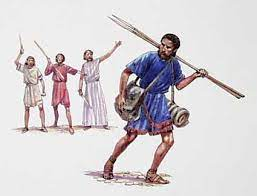There are many stories in the Bible that are perfect for the big screen. I have often wondered why many are not movies but one I came across recently was a story in Judges 11. The book of Judges, and for that matter Samuel and Kings, contain so many stories that I would have thought Hollywood would have had a field day turning these epics into million dollar money making film experiences. I no the reason they don't is because Christianity is a dirty word now, but still, the absence is a little puzzling given the potential money to be made by exploitation our species love for grand stories.
Of course, being a Judeo-Christian society, there has already been many Bible movies but the modern ones have been particularly terrible. Noah, with Russel Crow playing the hero, had a fairly obvious anti-human, so called pro-environment agenda running through it. It was honest in that much of the environmental agenda today pulses with an anti-humanism, but the Director certainly took no issue in using Noah and the Flood as a backdrop for his or hers particular ideological leanings. The movie also had rock creatures - the Fallen angels apparently, and they fought an epic battle which was fun to watch.
Christian Bale also stared in a Biblical movie as Moses in Gods and Kings. It also did not paint God in the best of light - he was a child unsure of himself and prone to violent outbursts. To be fair, one could assume the Director was probably having a hard time reconciling the Christian God of The New Testament who sent his son to die for all, with the Old Testament God who more than once had children killed.
We of the faith often complain at our culture's current hostility to the faith, and it is safe to assume that there exists in Hollywood a desire to use movies to chip away at the Christian faith. Given this, that there is no movie depicting the events of Judges 11 becomes even more curious. In Judges 11, we are introduced to Jephthah the Gileadite, a mighty warrior. On account of being borne to a prostitute, his brothers drive him out of the family home. Not to be undone, Jephthah settles in Tob, where "a gang of scoundrels gathered around him and followed him".
Unfortunately, the author does not provide us the details on what these scoundrels got up to but the authors decision to omit this part of the story is fertile ground for film makers and story tellers. Perhaps they stole from the rich and gave to the poor, or perhaps they embarked on building a criminal empire, Al Capone style. I say it is unfortunate we are not provided the details because whatever they got up to must have been incredibly scoundrel like. In verse 4, it reads, "Some time later, when the Ammonities were fighting against Israel, elders of Gilead went to get Jephthah from the land of Tob". Evidently, this band of criminals had furnished a most spectacular reputation so as to warrant the attention of the elders when the country was under attack.
The text then proceeds to give an account of Jephthah as he sets about rescuing Israel but one can see the potential for a major Hollywood movie so far. The rejected brother, the life of an outlaw, and then the triumphant return - it has hints of Gladiator, a movie that also stared Russel Crow and also bent the historical record, but was actually good.
The end of Jephthah is the most interesting part of the story and were the meaning of the text could be moulded to fit one's agenda - like trashing God. Jephthah makes a vow, and in doing so, demonstrates the Ecclesiastical wisdom against making rash vows. On the eve of battle, he was probably nervous, our hero says to God that should God deliver his enemies to him, he vows to offer "whatever" comes first through his tent as a burnt offering. It turns out, it was his daughter, who tells her dad he must fulfil his vow to God, and after spending some time in the mountains with her friends, returns, whereby her dad offers her as a burnt offering and so beginning a long list of commentaries on this particularly vexing conclusion to what was an exciting story.
The truth is often purposefully elusive in the Bible - a straight read of Genesis has lead many pasters to conclude that humanity sprung from the incestual relationships between Adam and Eve's children, but in this passage, like many others, the truth is hidden below layers of Biblical and ancient cultural context. The burnt offering in this story was not the typical burnt offering associated with dedications to God in the Temple, but was another way at saying that Jephthah intended to dedicate his daughter to Temple Service. God then did not burn her to death, or anyone for that matter in this story. Instead Judges 11 is an important lesson in knowing the social, cultural and political context of the Bible, proving that old adage, context is king.


Comments